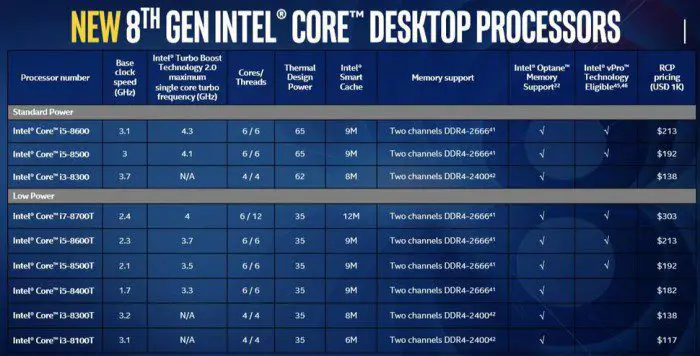In view of this, the biggest news of the announcement of new products today is to bring the Core i9-8950HK’s flagship product to the notebook platform (‘K’ stands for no frequency lock, and its core frequency reaches 4.8GHz).
Recalling previous traditions, Intel is accustomed to tagging the H-series processor (quad-core version) with an ‘HQ’ suffix.
This type of processor will be retained, but the new six-core version will only have an ‘H’ suffix, including Core i7-8750H and i7-8850H. Finally, there are six-core Xeon E series processors with a TDP of 45W. As for Core i5-8300H and i5-8400H, it is a 4 core / 8 thread chip.
Of course, Intel has not forgotten the U-series new products for ultrabooks and variants. The Core i7-8259U, i5-8269U, i7-8559U are still 4 cores / 8 threads, but the core part has been upgraded from UHD Graphics 620 to Iris Plus (not yet available in the existing 8th generation processors). Interestingly, Intel also introduced a Core i3-8109U. Although it is a dual-core/four-threaded processor, it has been approved by Iris Plus.
It should be pointed out that Microsoft Surface Pro and Surface Laptop have used the 7th generation Core i7 chip with Iris Plus, so these products should also get a refreshed version of the 8th generation chips.
Intel also expanded its own lineup of 8th generation desktop processors today, including the Core i3-8300 (quad), i3-8500 and i5-8600 (six cores), but none of them support Hyper-Threading.

The other is the new T-series desktop processor optimized for power consumption. The TDP further went from 35W to 35W, including 6-core/12-thread Core i7-8700T.
As for the Core i3-8100T / 8300T, i5-8400T / 8500T / 8600T, they are all quad-core or six-core chips that do not support Hyper-Threading.
Finally, the new vPro chip for mobile and desktop platforms, which joined the support of proud of storage and lightning 3, including harder multi-factor authentication, improved BIOS security.
To demonstrate these new selling points, Intel will also put some processors on the i5+/i7+/i9+ titles. Interestingly, the company seems to have forgotten the 8th generation Y-Series. As the ultra-low-power chips, perhaps Intel is waiting for the arrival of the first 10nm chips.
Source: TechReport, Cnet

